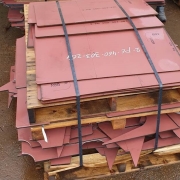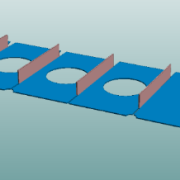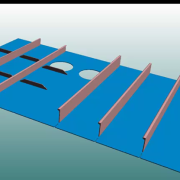In the spotlight: Robotized ‘Shared Facility’
In 2019, the Groningen Maritime Board commissioned the ‘Inventory Study Cost Reduction Shipbuilding North Netherlands’, with support from the province of Groningen. Conoship International and Marstrat conducted this study into the ambitions of the Northern maritime industry, which has led to a new, exciting opportunity: the feasibility study of a ‘Shared Facility’. This feasibility study will investigate the technical, organizational, and economic viability of producing micro panels for a group of shipyard in a robotized way in a central ‘Shared Facility’.
This Shared Facility will facilitate the robotized production of micro panels. This production process will be robotized as much as possible and feasible. The aim is to improve efficiency and optimize cooperation throughout the chain. The initial results of the Shared Facility project already show great promise. In this article, we will cover how robotization will:
- help to produce ship hulls more efficiently,
- reduce costs for the Northern Netherlands shipbuilding industry,
- give a competitive edge in the industry,
- and provide a positive contribution to society.
From component to micro panel to section.
Reducing costs for production
Global developments in the last decade have put a strain on the European shipping industry. If the sector is not able to adapt, it may lose its position in the global economy. That’s exactly why the Northern maritime sector has a great interest in improving its efficiency. Automation and robotization are great tools to realize this. Automated processes increase quality and shorten turnaround times. In turn, this results in:
- more output,
- better quality, and
- lower costs.
This will provide the sustainable growth required to obtain a leading position at an international level.
However, we cannot do it alone. It is essential to work together across the shipbuilding chain to make this happen and implement the necessary changes. That is why the Shared Facility project combines the strengths of Conoship International, GMB Foundation, FME, and Marstrat, with the knowhow of the shipyards and specialist suppliers in the Northern Netherlands.
Improving our competitive position in the maritime industry
The application of robotization and automation is necessary to improve the competitive position of the Northern Netherlands manufacturing industry on the global playing field. In turn, this will create more jobs for our region. There are several important focus areas within this project:
1. Implementing a comprehensive approach
Many companies within the shipbuilding industry specialize in producing customer-specific and modular solutions, with small series per product. Robotized section building requires an integrated, comprehensive approach, which makes it tricky to implement.
This demands a cultural shift across the entire design phase. Rather than thinking in terms of processes specific to one company, we should approach the design from the perspective of the entire shipbuilding chain. This will help the full shipbuilding chain to achieve significant savings throughout the process. A degree of standardization of the processes is paramount here.
Once this threshold has been crossed, every participant in the chain will reap the benefits of the added value and improved efficiency that this transition will bring to the shipbuilding industry in the Northern Netherlands.
2. Tight labour market
The ageing population, the lack of young recruits and the scarcity of experienced workers constitute a serious risk for the sector. The integrated use of robots could provide solutions. Older employees can still contribute using their years of experience, without putting strain on their bodies. Moreover, with digital and automated production techniques, we can attract a new generation of professionals to be trained. In this way, both groups can cooperate and generate higher quality and productivity for the company.
3. Artificial Intelligence
Also central to the theme of robotization is the better use of data. Artificial Intelligence (AI) could lead to greater insight and better control of information in the chain.
According to the Inventory Study, the improved use of data will add value to, among others, the current CAD/CAE/CAM system CADMATIC. This system contains the complete digital model of a new ship: the ‘Product Digital Twin’. Production information can be generated from this model, which can be used to control cutting machines and automated systems such as welding robots and collaborative robots (Cobots: robots that work in conjunction with humans).
Within the project, it is now possible to use the digital model to generate the product information required for the manufacturing of micro panels.
The digital product information will eventually be used in such a way that new digital production processes can be developed, tested and controlled in a virtual environment. The next step is to build a self-learning production process through the application of AI. This will improve the predictability of quantities and quality.
Positive social impact
The project has a broad social and economic impact. Initially, the focus will be to maintain employment in the sector and improve the competitive position of the shipbuilding industry in the Northern Netherlands. Robotization of micro panel production at the Shared Facility offers shipyards the opportunity to build more ships per year with the same number of employees.
Every shipbuilding project also require a large number of suppliers. Every ship under construction demands the installation of engine room systems, electrical systems, ventilation systems and insulation. More ships per year per shipyard means that more employees are needed: fitters, painters, carpenters, etc. The logistics sector, machine builders and educational institutes will also benefit. In other words: more jobs and more opportunities.
The concept extends beyond the scope of this project. In the future, it can also be translated to other sectors in the maritime industry, such as yacht building. The expected growth of employment in the Northern Netherlands maritime ecosystem is between 350 and 400 FTEs. Digitization and robotization will also attract the younger generation to the maritime sector, providing a wave of fresh talent.
In summary, the Shared Facility project provides a positive social impulse for the Northern Netherlands.
The feasibility study on the Shared Facility is set to conclude halfway through 2022.





 Conoship International
Conoship International
